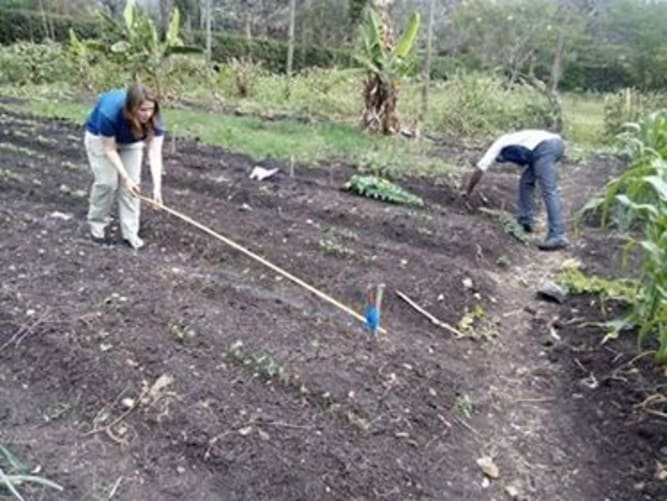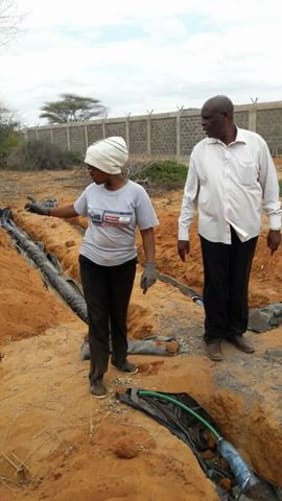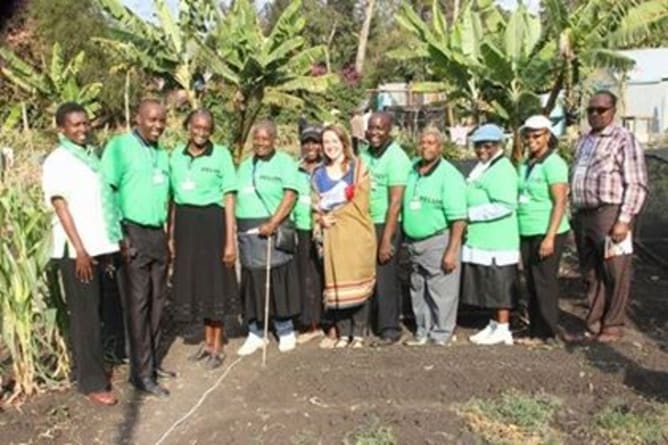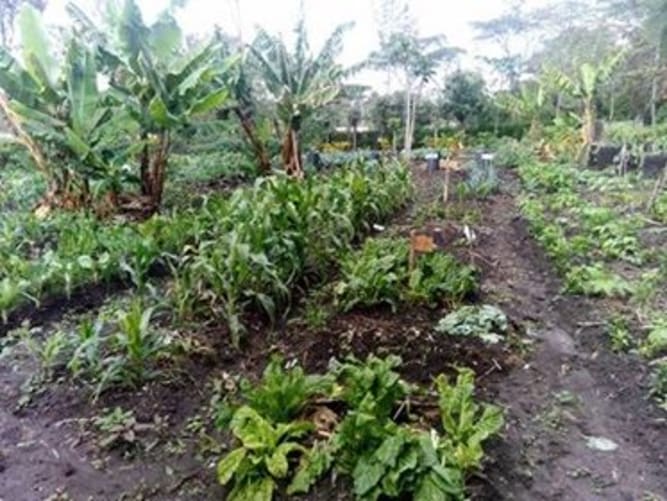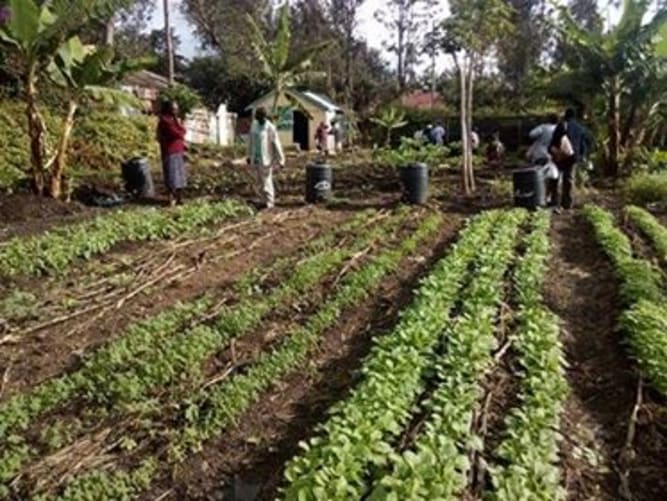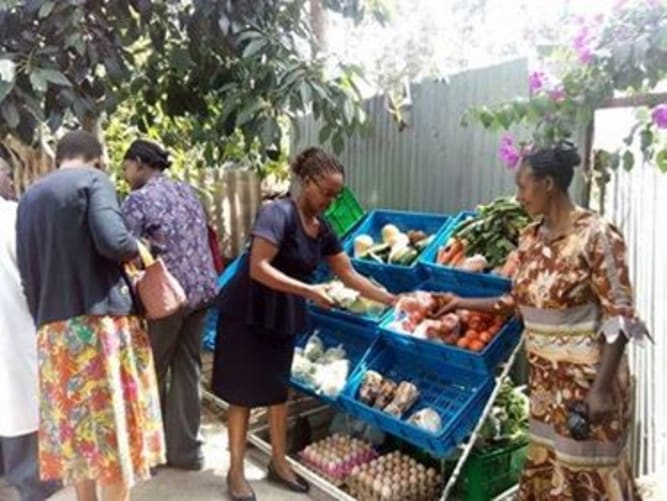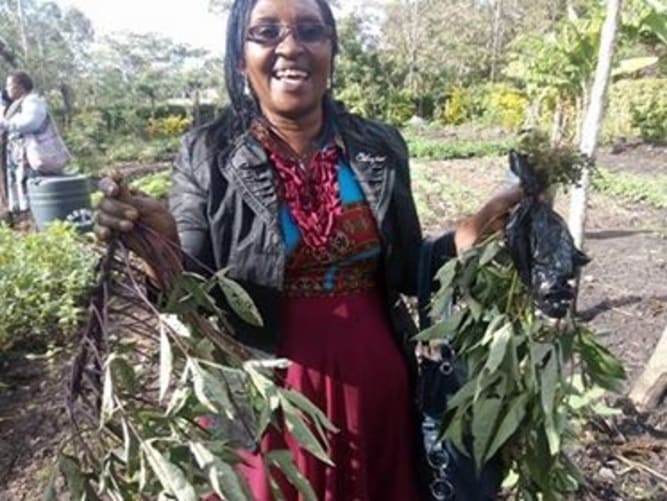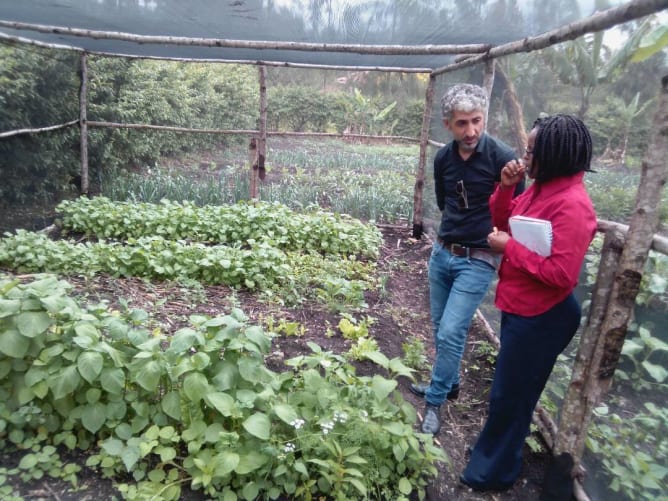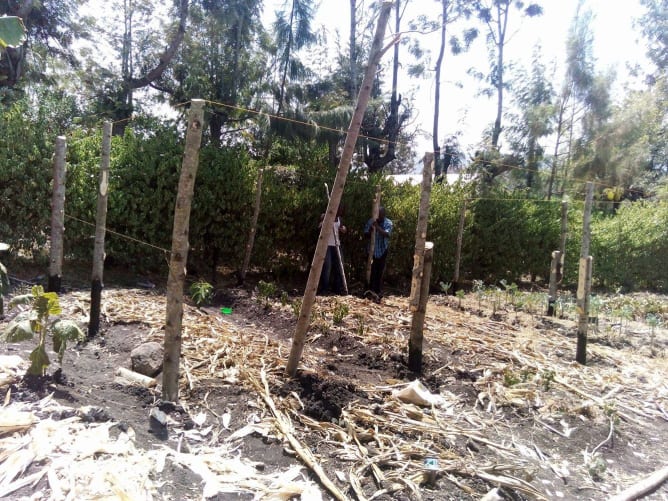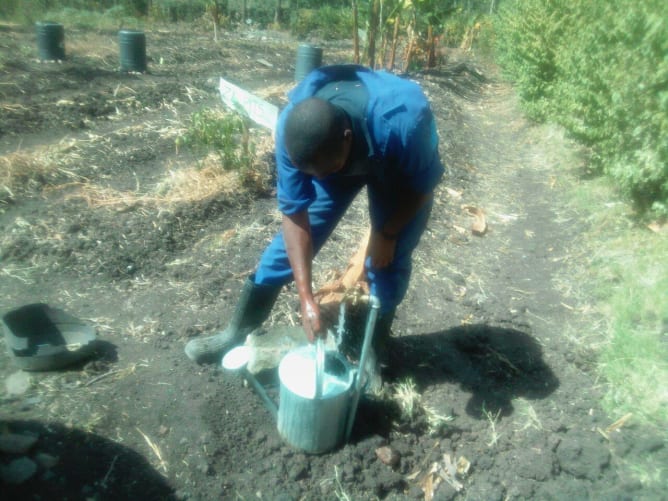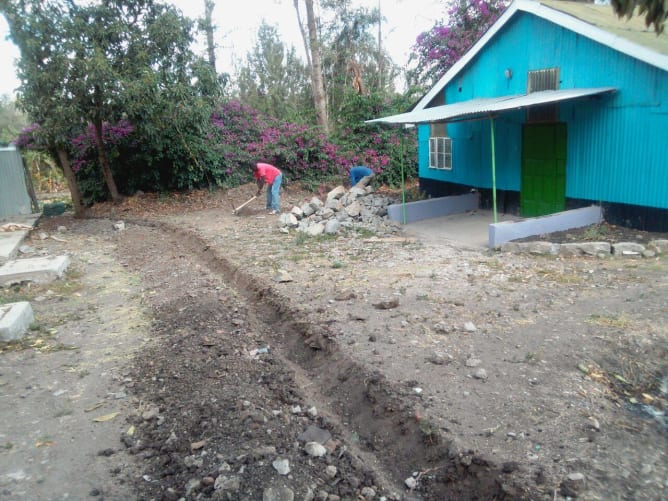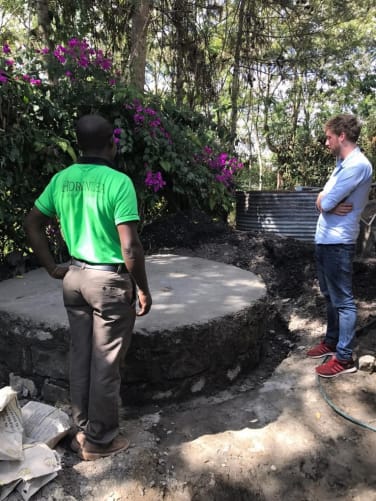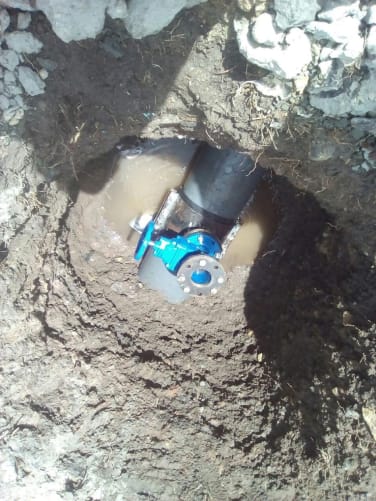
Healthy Farms for Kenya
by Caroline Moraza, Lucas Zahl, Silke Stoeber, and Esther Kiruthi
Read update
.
Read update
has been a while since our last update and much has been going on at CSHEP Kenya! Esther and Steven hosted a number of well-visited farmer trainings, collaborated with foreign academics on their demo plot, innovated their production methods and greatly profited from the installed water infrastructure.
Soon after our last update the shade net structure was finalized. It now serves as a nursery for young plants. Under the shade net the planted seeds are safe from being eaten by birds and the net also creates a micro-climate under it, where young seedlings can thrive in a cooler and moister environment helping them grow into strong crops. Esther has reported to the team that especially this little micro-climate they are able to create with the net is truly amazing. Under the net the climate is much more pleasant and cooler compared to outside in the open. On top of that the improved water supply on the farm really serves as an insurance that they will be able to sustain their young seedlings and all the hard work put into growing them isn’t lost when it gets too hot or dry. As an innovation on the farm the shade net really is an attraction for many field day visitors, as they realize they could also improve their results so much if they would adopt such a net.
Another nice development at CSHEP concerns the trainings Esther and Steven have been hosting. They were able to reach a considerable amount of farmers (about 200) in the past 6 months. But most importantly they were able to market their services in such a way that the attendants of the trainings carried costs for receiving training and did not simply rely on the goodwill of CSHEP (as was unfortunately often the case in the past due to the local socio-economic circumstances). The farmers attending the trainings would cater for their own transportation, arrange the space needed for a large group to meet in and would also pay a small fee for attending the trainings (500 Kenyan Shilling equivalent to approximately 5 €). CSHEP in turn provided a trainer and offered according to local custom some tea and snacks. At first Esther says they were a bit nervous, this set-up of sharing costs would lead to only few farmers showing up, but against their fears the turnout was great. The farmers have been receiving training on for example growing herbs as an interesting crop for income generation, introduction to organic agriculture, and the theory on the green river irrigation system. CSHEP was even able to include 5 local companies who exhibited their products during the trainings. This shows that CSHEP is expanding its network and acting as broker of sustainable agriculture in the south Nairobi area. Finally, training is also accompanied by practical training through a visit to the farm as for many people ultimately «seeing is believing». Additionally to the theoretical trainings, CSHEP has also been hosting field days where farmers get to test and trial the exhibited farming innovations (setting up sack gardens, nursery management, cropping and irrigation techniques…). Esther says after having installed the water supply with the help of crowdfunding they were able to plant and maintain so much more at the demo garden attracting people to come more frequently and experience the organization’s work, finally enticing them to book trainings with CSHEP.
Another great effect of having more people come to CSHEP is the increase in demand for the farm’s produce. Esther and Steven have organized a market place to sell off their produce but also that grown by farmers linked to the CSHEP community. The market sales are enjoying quite some popularity!
Furthermore with the crowdfunding money Esther and Steven spent a bit on the maintenance of their new water infrastructure. They had realized that they needed to make a concrete stand around the tap since they realized it was getting instable due to the soil getting soggy. It’s good to know they are keeping up with the maintenance and take care of their farm. Also, the two are still dedicated in expanding their fruit tree portfolio. Especially, after they were acquainted with this very helpful cropping calendar that was recently designed by the World Agroforestry Centre (http://blog.worldagroforestry.org/index.php/2015/08/04/first-fruit-tree-portfolios-established-in-kenya-in-a-novel-approach-to-improve-year-round-nutrition/ ).
CSHEP has also been deepening its role as intermediate/networker between research and on-the-ground implementation of farming innovations. Throughout the past half year Dr. Emil Gevorgyan of Humboldt-Universitaet’s institution «Center for Rural Development (SLE)» visited the farm. He suggests in the future setting up a collaboration with CSHEP showcasing several innovations and evaluating its impact on the region. Additionally, Katarina Kullinski, a Master student from Humboldt-Universitaet stayed for 3 months with CSHEP to do her thesis research. As a part of this she had a key role in helping design and construct the shade net, which was key for her field tests. She also has helped CSHEP in setting up a so-called «zero energy charcoal cooler». For information on how this cooler works, check out this link: http://www.nation.co.ke/business/seedsofgold/Our-charcoal-cooler-keeps-produce-fresh-/2301238-2397960-vfgm79z/index.html. Esther has pointed out that the cooler is of great help as they can now preserve a large amount of produce, both from the CSHEP farm including the ones from the farmers as they wait to be sold at the market. Katarina’s goal is to do some cost-benefit evaluations on how the shade net and the cooler can affect a farm’s economic situation. Next to Emil and Katarina, CSHEP has had further student attachments coming in from Kenyan academic institutions. So far it has been David from JKUAT (Jomo Kenyatta University of Agriculture and Technology) and Evans from the Rift Valley Institute who offered some additional support to the development of the farm. Finally, after having been approached at the Rainwater Smart Management Symposium we attended in January in Nairobi, CSHEP received a small assignment from Garissa University to install and give training on the Green River Principle on their university grounds. Lucas took some time off of work and joined the team lead by Prof. Julius Huho to support them as our Green River expert. So far Garissa University’s trials of the GRP are on-going as they aim to collect data on the system’s effectivity.
Despite all the positive developments at CSHEP, unfortunately the team has been encountering some difficulties due to the political situation in Kenya. Since late summer the anxiety in the population has grown as a result of the fierce political campaigning. This has caused many people to stay home and avoid meeting in large groups for e.g. trainings. The situation continued to worsen resulting in the re-elections, as Esther told us: «We are in political hostage. Not so nice». Even though no large riots or killings took over the country, the situation still remains uneasy. This is definitely taking a toll on CSHEP’s work. On top of this since October the Kiserian area has been experiencing some fierce drought causing the dam, an important water source, to drastically dry up. As a result despite the improved water supply at the farm, there is a lack of water. At CSHEP they are trying very hard to fight against the dryness by for example excessively covering the crops with mulch.
We will stay in touch with more news… For now we wish our wemakeit community happy holidays and a great start into the New Year!
Read update
VERSION BELOW**
Nach der Funkstille seit Februar freuen wir uns, euch endlich ein Update zu geben und zu berichten, was sich bei CSHEP verändert hat. Während Caros und Lucas’ Besuch im Januar/Februar in Kenia, konnten sie Esther und Steven bereits einen Teil des Geldes persönlich übergeben und gemeinsam mit ihnen anfangen, die geplanten Aktivitäten umzusetzen. Der Rest der Gelder wurde nach einigen Schwierigkeiten mit den Banken und längeren Wartezeiten, auf das Konto von CSHEP überwiesen. Nach dem Überwinden dieser bürokratischen Hürden können Esther und Steven nun weiterführen, was wir gemeinsam begonnen haben und neue Projekte in Angriff nehmen.
Die Verlegung des Wasseranschlusses ist inzwischen fertiggestellt und ein großer Wasserspeicher wurde aufgebaut. Das ermöglicht eine ausreichende Wasserversorgung der gesamten Gartenfläche waehrend der Trockenzeit.
Esther und Steven haben in den vergangenen Monaten hart gearbeitet und viele neue Trainings für lokale Farmer organisiert. Die über das Crowd Funding gesammelten Gelder helfen Ihnen dabei auch, abgelegene Bauern zu erreichen und ihr Wissen mit denen zu teilen, die nicht die Möglichkeit haben, nach Kiserian zu kommen.
Zu Beginn der Regenzeit wurde die Farm neu bestellt und viele Gemüsekulturen gepflanzt. Auch unser innovatives und wassersparendes Mikrobewässerungssystem Green River Prinzip ist dank des Wasseranschlusses wieder in Gebrauch.
Eine weitere großartige Entwicklung auf der Farm, die durch Ihre Spenden möglich wurde, ist der Bau eines kleinen Gewächshauses. In ihm werden Setzlinge gezüchtet, die in den ersten Wochen ihres Heranwachsens besondere Pflege und Schutz brauchen. Nach wenigen Wochen können diese dann auf der Farm gepflanzt, verkauft oder den Bauern übergeben werden.
English version:
After a long time of not hearing from us we owe you an update of what’s been going on at CSHEP! Luckily as Lucas and Caro were in Kenya last January/February they could already give Esther and Steven a part of the funds so we could start the first activities. However, the rest of the money had to be transferred from the account in Germany to CSHEP’s account and unfortunately it took such a long time till the money finally arrived in Kenya…. But luckily it all worked out and Esther and Steven were able to carry on with what they had already started!
The construction of the water connection has by now been finalized allowing us to back up the on-farm rainwater supply with the additional communal water supply.
Esther and Steven have also been working hard on giving further trainings to the farmers in the area. The funds are such a great help in securing their means for transportation to and from the farmers’ locations.
In anticipation of the rainy season, activities at CSHEP are in full course with many crops being planted and our water-smart micro irrigation system (the Green River Principle) back in use.
Another great thing that has been going on is the construction of a small nursery! This was made possible by the extra money we were able to collect thanks to your support. With the help of this simple greenhouse we are able to create a cool and shady spot protected from birds and animals helping us nurse small plants and trees. We can now produce seedlings more efficiently allowing for more sales to the local market.
Read update
ar supporters!
Since a few days Lucas and I are back from our very succesful trip to Kenya. We travelled there as we were invited to present at a conference on rainwater smart management for sub-Saharan Africa. This was also a great opportunity to set out the first steps of our crowdfunding project together with Esther and Steven. Thanks to your support we were able to make the first purchases towards connecting the demo farm to a reliable and sustainable water supply! Here are some pictures of the first progress we made at CSHEP:
Read update
Farmers and Lucas and Caro say thank you from Kiserian’s demo farm
https://youtu.be/kg0TupjpiUw
Actually Esther is speaking first, then two farmers talk, Lucas and Steven are listening, and Caro is taking the video (so you can’t see her :)
Read update

ar 45 supporters, a super super great contribution from all of you, YES, indeed, with YOU, with YOUR help we will make the project a healthy real case. Esther has negotiated with the municipality to make the water supply and Steven started installing the water storage on the demofarm.
Please also remind your friends and colleagues – if you haven’t done it yet –to contribute to this project – each cent counts! The budget more than 6000 Euro will be used for tree planting, vegetable nurseries, farmer training, and solar dryers for fruit and vegetables to reduce post-harvest losses. Thank you very much – Asante sana
Liebe 45 Unterstützerinnen und Unterstützer, eine wirklich ganz super tolle Beteiligung von Euch, JA, ganz ehrlich, mit Eurer Hilfe werden wir das Projekt realisieren können. Esther hat schon mit der Gemeindeverwaltung verhandelt wegen des Wasseranschlusses, und Steven das Fundament für die Zisterne gemacht. Bitte erinnert doch auch Eure Freunde und KollegInnen – sofern noch nicht getan – dieses Projekt zu unterstützen, jeder Cent zählt. Alles, was über 6000 Euro hinaus geht, wird für Baumpflanzungen, Gewächshäuser, Kleinbauerntraining und Solartrockner für Obst und Gemüse verwendet, letzteres hilft dabei, die Nachernteverluste zu verringern. Vielen lieben Dank –Asante sana.
A nice collection of lesos – a present for some of you, Caro bought it last week in Kenya on the market. Hier warten schon die Lesos auf Euch.
Read update
Wow! Thank you so much! This is incredible – we still have 25 days to go and just now we achieved 101% of our funding goal. Just this morning (when we were still at 5.764€ :D ) we were talking about how we would like to post a short thank you note on this page… and a few minutes ago our funding goal was surpassed! We would like to extend our thanks to all of our supporters and let you know that we are really excited that our initiative has been made possible. As the funding goal has been reached before the deadline hits, we are now even able to collect an even bigger sum than originally planned. Therefore we thought we can go ahead and share with you what we plan to use the additional support for:
- organization of additional trainings in 2017 for our smallholder farmers
- further development of our weekly farmer’s market
- expansion of our direct marketing scheme of CSHEP and partner farmer products
- planting of addtional crop trees (e.g. moringa, avocado, etc) on the demofarm
P.S.: aan alle onze supporters uit Nederland – heel erg bedankt!!! :-)
